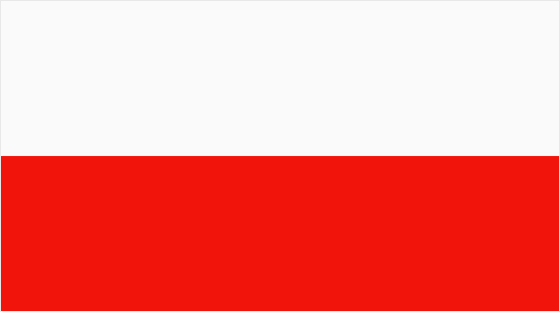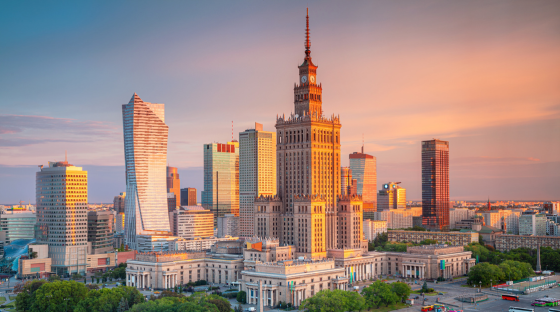Poland

Overview
Although the gloss has been dulled a little recently due to current economic and geo-political factors in the region, Poland remains Europe’s growth champion and is well placed to compete in the international market for software development talent. The creation in 2018 of the Polish Investment Zone underpinned its attractiveness to investors, effectively turning the country into a special economic zone where setting up or developing a company can qualify for tax exemptions.
Large US companies, such as Google, Samsung, Facebook, Amazon and Intel, are among those who have set up operations there. Google’s Polish story is another endorsement of the country’s tech sector. Having set up shop in 2007 with a tiny office and just a few staff, Google has since heavily invested and recently committed $700 million for the purchase and further development of The Warsaw HUB, a modern office complex right in the heart of Poland’s capital city. Its investment is reported to provide the company with scope to expand IT jobs from its current staff count of 1500 to 2500.
Interesting fact: The city of Wrocław is home to the oldest restaurant in Europe. Piwnica Swidnicka opened for business in 1275 and is still serving delicious “traditional dishes with a modern twist”. Pierogi, perhaps the country’s best-loved dish, is a version of the Chinese dumpling, thought to have been brought back to Europe by Marco Polo in the 13th century.
The Accelerance Global Network is the most curated list of high-quality global teams ever assembled.
1185
Developers
Total number of developers in our certified partner network by country
4
Certified Partners
Total number of certified partners in our global network by country.
9hrs
Time Travel (From NY)
Average flight time from NY to the major cities in the country.
38
Partner Innovation capability
The score reflects investment in STEM progrms and IT funding by country.
89
Partner Skill Level
Level of workforce skills and quality of education, including factors such as digital literacy, interpersonal skills, etc.
37
Partner Global Competitiveness
National productivity based on 12 core pillars, including government policy, infrastructure, economic stability, etc.
High
Software Outsourcing Readiness
Overall rating, based on the maturity of the tech sector, socio-political conditions, and on-the-ground research by Accelerance.

Talent Pool & Education
Poland has been described by tech leaders as a “hotbed of opportunity”. Government tax incentives make it a top choice for software outsourcing and the country places an emphasis on STEM (science, technology, engineering and math) subjects. According to the National Science Foundation, the biggest funder of science in Poland, 43% of Poles aged 25 to 34 have a bachelor’s degree or higher in technology or software development.
Poland is home to more than 3,300 startups and with some 295,000 software engineers, it boasts the largest specialist talent pool in Eastern Europe. New tech businesses primarily specialize in software, medtech, AI, hardware, and deeptech. In 2024, the main areas of focus were SaaS (39% of start-ups), web applications (36%), and mobile solutions (26%). However, finding investors has been more difficult in recent years, due to difficult economic conditions in Europe and the Russian invasion of neighboring Ukraine.
Language
While the official language is Polish, English is widely spoken and understood in major cities and tourist destinations. Roughly a third of Poles speak English, making it the most popular second language in the country.

Economic Outlook
Poland, the largest economy in Central Europe, has been in the European Union for 20 years. The economy performed well in early 2024 on the back of rising domestic demand, declining inflation, ongoing wage growth due to a tight labor market, and a staged increase of the minimum wage. Forecasts are positive, with the European Bank for Reconstruction and Development picking 2.9% growth in 2024, and the World Bank seeing a rise to 3.4% in 2025.
This rebound follows two rollercoaster years where the country’s economy grew by 5.3% only to slow markedly to 0.2% following Russia’s invasion of Ukraine. Revenue shortfalls (from tax reforms), increased defense spending, higher debt servicing, and measures to protect households and firms from the energy and food price shocks contributed to the widening of the fiscal deficit.
The Polish Economic Institute, a public economic think tank, notes stagnation in the construction industry, along with low investment results and weak export growth – reflecting wider economic challenges in the region. However, it expects the unemployment rate to remain one of the lowest in the European Union and wage growth in 2024 to maintain double-digit pace.
Political Conditions
Political sentiment in Poland is deeply divided. Despite Polish Prime Minister Donald Tusk’s centrist party topping the pole in the June 2024 European parliamentary elections and his chief opposition party, the national-conservative Law and Justice failing to finish top in a Polish election in a decade, closer analysis points to a swing to the right.
Tusk came to power in December 2023 on promises to bring Poland back into the EU fold and built an awkward coalition that unites parties from the left and right. The diverse coalition has made it difficult to find consensus, slowing action on a range of issues from abortion and the climate crisis to immigration and agriculture. While the Prime Minister’s party did not take a hit in the latest election, his partners did: the center-right Third Way (Trzecia Droga) and The Left (Lewica), finished with 7% and 6% respectively.
Coming into the Europe elections, Tusk softened some of his campaign’s EU-friendly rhetoric on issues such as agriculture and migration but was outspoken on the threat he sees posed by Russia. Analysts suggest the latter is a factor in Tusk’s party’s vote holding up; a 2022 report by the Pew Research Center found 94% of Poles saw Russia as a major threat, with a record proportion holding favorable views of the US and the European Union.
Learn more about our customer stories.
Looking for a customer story in a specific technology or industry? Discover compelling customer narratives within a specific technology or industry that resonate with your unique software development needs.


.png?width=300&name=Copy%20of%20WEBSITE%20Stop%20Chasing%20Low%20Hourly%20Rates%20Unlock%20the%20True%20Value%20of%20Offshore%20Development%20(450%20x%20253%20px).png)



